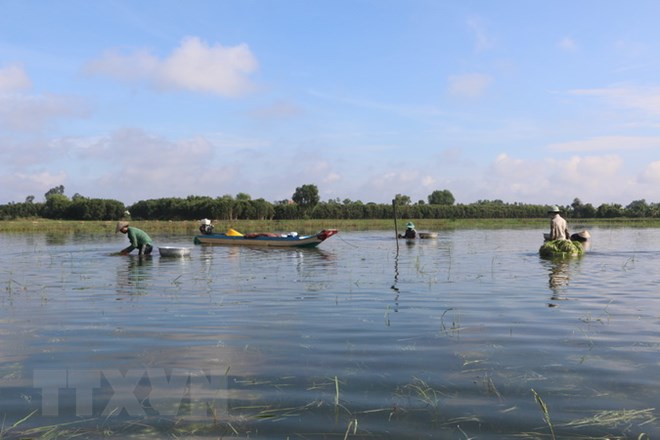New report reveals banks are not harnessing their balance sheets to support climate goals or the UN Sustainable Development Goals despite 88 per cent of them acknowledging the environmental and social impact of their business activities.

A new WWF report finds ASEAN’s biggest banks are increasingly aware of the impact that their businesses have on the environment and society but are slow to act on the huge potential they hold in addressing climate change and financing sustainable food, energy and infrastructure systems in the region. The region is particularly vulnerable to climate change which exacerbates food and water insecurity. By not considering these issues, banks stand to miss out on ‘game changing’ opportunities for the region’s sustainable development and may face unmitigated climate risks in their own balance sheets.
The report, published in collaboration with National University of Singapore (NUS) Business School’s Centre for Governance, Institutions and Organisations, finds that ASEAN banks are not disclosing how they manage climate risks in line with the recommendations of the Taskforce for Climate-related Financial Disclosures (TCFD). Of the 34 banks assessed, only four disclosed that senior management has oversight of climate change risks and opportunities, a key recommendation of the TCFD. Meanwhile, no banks disclosed whether they review their portfolio exposure to climate risks nor disclosed their portfolio alignment with the Paris Agreement or the SDGs.
“This is an existential issue impacting all of us. Forests and other ecosystems play a critical role in mitigating climate change thereby ensuring resilience in ASEAN food supply chains. Banks must take urgent steps to address key risks within the activities they finance, such as deforestation and water risk, and allocate capital to transform the region’s food, energy and infrastructure systems for a sustainable future,” said Jeanne Stampe, WWF’s Head of Asia Sustainable Finance. “How we use land to meet society’s needs, for example for food, clothing, paper and fuel can no longer be part of the problem; sustainable land use must be part of the climate solution.”
Focusing on investors’ expectations in relation to ASEAN banks and the food sector, Peter Ferket, Head of Investments for Robeco (which has EUR 167 billion assets under management), said, “We are advancing sustainability in the palm oil sector by not only engaging with companies producing palm oil but also engaging in a constructive dialogue with ASEAN banks that finance the palm oil industry. This strategy allows us to arrive at industry-wide solutions to halt deforestation, prevent exploitation of workers and ultimately contribute to sustainable economic development in the ASEAN region.”
Despite these drivers, the report finds that many banks’ policies on ESG are weak and not even disclosed, leading to concerns about how well these banks are managing ESG risk.
Although some progress on ESG integration has been made, particularly on the part of Singaporean banks and a few Malaysian and Thai banks, disclosure of specific ESG requirements of banks across ASEAN remains limited. Nineteen banks disclosed they have a standardised framework for ESG risk assessment but only seven disclosed that they have specific policies for high ESG risk sectors. Even then, disclosure of the policies themselves is limited, with just three banks disclosing one or two of their key policies.
Regarding specific E&S risks, only five banks in ASEAN recognized deforestation risks - a key contributor to climate change - in their clients’ activities and only two recognized water risks. Given these are key risks for the food and agriculture sector highlighted by the TCFD, the implications for regional food and water security are worrying.
Vietnamese banks have shown slight progress with more banks understanding that their impact lies in their portfolios rather than their own direct operations. However, they have not disclosed ESG policies and processes, indicating that disclosure is not yet a mainstream practice.
Jeanne Stampe added, “For countries in ASEAN to meet their climate and sustainability commitments, banks must take further action. They must develop and disclose detailed ESG policies and procedures, including specific science-based criteria for key ESG risks. For example, banks should implement ‘no deforestation’ policies. Banks should also be concerned about the water risk faced by companies they finance and one aspect of this is requiring their clients to commit to water stewardship.”
Banks in ASEAN must better position themselves to take advantage of the extensive opportunities offered by the transition to a low-carbon, sustainable future.
The report finds that ASEAN banks are capitalizing on opportunities in response to climate change and the need for sustainable development with 22 banks disclosing they have developed green financial products such as green bonds and sustainability-linked loans. However, these niche products will not be sufficient on their own for the huge investments required to meet the Paris Agreement and the SDGs by 2030. In order to properly capitalize on this opportunity, banks must set science-based targets to align their portfolios to a resource- and carbon-constrained world. The report finds that banks in ASEAN have not yet done this, and may be missing out on opportunities while continuing to be vulnerable to the impending transition and physical risks of climate change.
If the ASEAN region is to experience resilient and sustainable development, banks must accelerate the rate at which they fully integrate ESG, including climate, deforestation and water risks, into core business strategies. Banks play a crucial role in financing the transition to sustainable food, energy and transport systems in ASEAN and must be part of the solution. Responsible investors, as stewards of capital, need to ensure that their portfolio banks are making timely progress on this, and engage actively with them to support the transition.